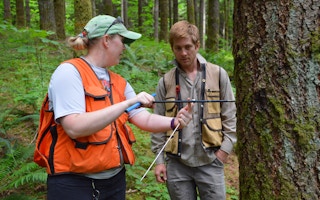With health and economic impacts at the forefront of global concerns, what’s happening to the people whose job it is to protect the future of our health, wealth and wellbeing – that of the planet?
Once labeled a field for ‘radical environmentalists,’ today conservation is a diverse and booming sector that employs hundreds of thousands of professionals worldwide and draws thousands of passionate people through its doors each year.
They are the youth who envision a world where decision-makers don’t compromise their futures. They’re the professionals who wake up mid-career seeking more than a paycheck and security. They’re the people who put meaning before material gains, community above competition and tomorrow’s prosperity ahead of today’s profit.
Rangers and researchers, fundraisers and filmmakers seek little recognition as guardians of the planet for future generations – the oceans we fish, the forests we harvest and the species that have intrigued and inspired us for millennia. But how has the employment sector for conservationists been hit by Covid-19?
“
The conservation sector has something that makes it uniquely resilient to threats like global pandemics: limitless passion and determination, and a global community of people to turn to for motivation, creativity and inspiration.
Conservation jobs: On hold?
As of April 2020, conservation job and internship opportunities worldwide have dropped by an estimated 50 per cent compared to their normal levels.
“Conservation Careers scours the job markets globally each day to find the best opportunities to share, and have seen rates drop from 130-240 to around 50-100 new job and internship opportunities per day, with the most dramatic decrease during the last two weeks of March 2020,” said Dr. Nick Askew, director of Conservation Careers.
Conservation employers share a similarly grim story. Of 67 conservation employers who responded to an online survey by Conservation Careers during March and April 2020, over 90 per cent said their recruitment or staffing has already been negatively impacted by Covid-19.
These include shorter-term impacts – such as a shift to personnel working remotely, decreased hours, staff unable to fully perform their roles and extended hiring periods – and major impacts, including frozen donations and funding cuts, staff being laid off, seasonal crews or internships being cancelled and uncertainty looming over future funding.
For many of the organisations surveyed – based in countries including the UK, US, Australia, Canada, Malaysia, Madagascar, Costa Rica and Paraguay – recruitment has been suspended indefinitely in the face of uncertainty.
“Before [Covid-19], we were looking to recruit part-time development staff/consultants, and now our entire budget is dedicated to keeping staff on board,” explained one conservation professional.
“We anticipate spending down all of our reserves until we can no longer keep staff, then I will likely be let go.” Other organisations that are still hiring are struggling to fill roles with a dramatic drop in applicants.
And if conservation organisations are uncertain about their futures, conservationists find themselves even less certain of their careers.
In a survey of 330 conservationists by Conservation Careers in March and April 2020, 78 per cent reported that their job search or career has been negatively impacted by the pandemic, while 18 per cent aren’t yet sure how they’ll be impacted. Fewer than 4 per cent have not been impacted – yet.
Many conservationists have been laid off or put on unpaid leave or sabbatical indefinitely, while those looking for jobs and other opportunities – including a growing number of career switchers – have found their prospects greatly diminished.
Others who’ve recently made it to the interview stage or received job offers have had their applications postponed indefinitely or offers put on hold or withdrawn.
“I’ve been offered the dream job!” wrote conservationist Tania to her peers online. “I was offered the job of project manager in a very remote location with a great NGO – it’s an amazing place and an amazing role, two weeks ago I would have said yes instantly! But now I’m very worried about accepting, given the current Covid-19 situation…”
Layoffs, fewer job prospects and delayed recruitment aren’t the only way conservationists are being impacted. Students have had the field component of their dissertations postponed, cancelled or replaced due to lost research funding and travel restrictions.
Other conservationists have had to return home from contracts abroad, lost seasonal contracts, or are unable to pursue planned or prospective internships, projects and expeditions abroad.
“At Natucate, we had to cancel a large amount of our bookings,” said Daniel Kaul, founder of Natucate, a company offering voluntary service abroad on nature conservation, environmental and animal protection projects.
“Several conservation projects that we support can no longer operate and have to shut down activities, some of them even permanently. As crucial conservation work in these areas no longer takes place, nature and wildlife are put at risk again in the long term – a fact that deeply saddens us.”
If nature adapts, can humanity adapt too?
It’s taken only a handful of weeks without human interference for nature to remind us of its capacity for resilience, if we give it a chance.
In the absence of cruise ship visits offloading tourists and motorised boats kicking up sediment, Venice’s La Serenissima’s canals have been transformed virtually overnight, revealing the unique Venice lagoon ecosystem, complete with shoals of fish, crabs, plant life and even duck eggs.
Satellite images show air pollution has fallen in China and northern Italy, and air quality improved in countries like the UK within a week of lockdowns on non-essential travel. In the US, vehicle pollution has declined dramatically over major cities like Los Angeles, Seattle, New York, Chicago and Atlanta.
These improvements may be temporary, and could disappear as quickly as they came if business goes back to normal, but that doesn’t mean business should go back to normal.
At Conservation Careers we’ve interviewed over 500 professional conservationists. We know that a love of nature often comes from time spent outdoors, or – for those without access to nature – via zoos and documentaries. Perhaps all we need to care about our planet is time and space away from our usual fast-paced schedules and latest devices to stop, listen and learn.
Surely this is a wakeup call big enough to shift our short-term, fragmented attention away from social distractions and toward the role biodiversity plays in our health, wellbeing and economy. Despite its devastation, Covid-19 has given us a rare gift to pause and reflect on what’s really important in life – and question whether we’ve gotten our priorities wrong lately.
By ever-encroaching on habitats and forcing species to share space with humans, by allowing illegal wildlife trade to run rampant, experts warn, we’re also undermining natural safeguards and putting ourselves at risk of further outbreaks – and it’s not the first time we’ve been warned.
“… a number of researchers today think that it is actually humanity’s destruction of biodiversity that creates the conditions for new viruses and diseases such as Covid-19 … with profound health and economic impacts in rich and poor countries alike,” wrote John Vidal for The Guardian.
The global wildlife trade is the suspected perpetrator behind Covid-19, and the pandemic’s impacts on tourism and commerce could, at least temporarily, halt this devastating industry.
Right now, with our routines upside-down, we have the opportunity to re-think our priorities and strike a better balance between what’s normal and what’s natural – a balance between appreciation and exploitation, between fences and mass overtourism, between poverty and unlimited growth, between low quality of life and addictive consumerism, between local economies and unlimited flights abroad, between our children’s rights and today’s needs.
A balance better known as sustainability.
Conservation is no ‘ordinary’ sector
At Conservation Careers we’re seeing this trend as more and more youth and mid-career professionals look to conservation as a meaningful career. For many, Covid-19 is an opportunity to re-check the compass of their careers, and we’ve seen a recent surge in conservation job-seekers and career switchers signing up for online courses to do just that.
The conservation community is no ‘ordinary’ sector. Conservationists consciously choose, every day, to pursue the work they do – not simply because they need to pay bills, put food on the table or save for the future, but because they have an unfailing belief in a better world for wildlife and for people.
When a species is at risk, they hatch a plan to save it. When funding runs dry, they find a new source. When they feel lonely, underpaid or undervalued, or struggle with the scale of the global issues they’re tackling, they find renewed strength in community.
Organisations can adapt by using new approaches and technologies to monitor the natural world and communicate key messages. Strategic planning that gets lost amongst busy day-to-day schedules can refocus efforts where they are needed most.
The conservation community can use Covid-19 as an opportunity to recognise how much ‘necessary’ travel for meetings, conferences and regular work can be replaced with online collaboration platforms. “Using tools like Zoom to work remotely may increase productivity and make remote collaboration the new norm and travel the exception,” added Dr. Askew.
The conservation sector has something that makes it uniquely resilient to threats like global pandemics: limitless passion and determination, and a global community of people to turn to for motivation, creativity and inspiration.
For decades, conservationists have been urging us to wake up before it’s too late.
For decades they’ve been advocating for the species, habitats and biodiversity-dependent communities that don’t have a voice.
For decades they’ve been warning that if we keep burying ourselves beneath gadgets and growth, we won’t value our planet’s wealth until habitats are stripped and species have slid too far down the IUCN Red List of Threatened Species to ever climb back up.
Now is not the time to forget about conservationists or what they’re fighting for until the economy rebounds. It’s not the time to risk losing the skills and passion of new generations of conservationists who worry that jobs won’t exist or job security is too low.
Now is the time to recognise that nature is the future of our economies and our health, and make conservation a key area of job creation in the future.
Because even worse than what the world is suffering right now, is the risk of sinking back into old habits, distractions, denial and perceived invincibility – until the next disaster hits.
“Covid-19 proves that governments worldwide can enact change quickly, at a global scale, to tackle an immense threat,” concluded Askew. “Why, then, aren’t they taking appropriate action on climate change or biodiversity loss?”
“The recent surge in interest in environmental issues and their repercussions on people, thanks to activists like Greta Tunberg, shows the world is listening and we have the collective voice to demand a better world post-Covid-19.”
If environmental leaders, governments and global citizens unite around clear steps to halt climate change and biodiversity loss, imagine what we could achieve together, before disaster strikes.
This story was published with permission from Mongabay.com.






















